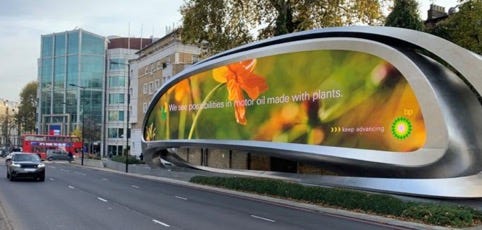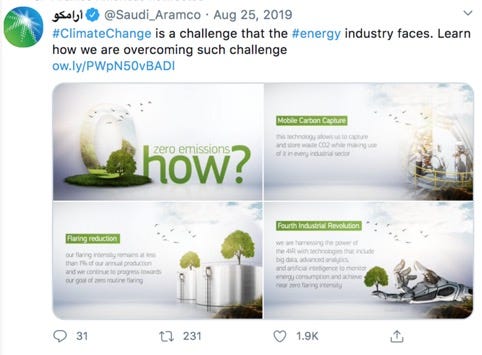CLIENTEARTH'S JOHNNY WHITE: DICHRON INTERVIEW
A candid conversation with attorney Johnny White discussing fossil fuel companies greenwashing on climate change and why despite flashy ads ExxonMobil is an oil and gas company—not an algae business.
7 minute read
The environmental law charity ClientEarth kicked off its campaign against oil and gas industry “greenwashing” in late 2019, in a push against advertising that misleads the public to believe burning fossil fuels can coexist with confronting climate change. In a first move, they filed a complaint against BP for an advertising campaign that implied that gas is green.
To ClientEarth’s shock, BP suspended this marketing push. Emboldened by its success, the environmental group then partnered with investigative reporters at DeSmog to examine advertising at nine other fossil fuel companies.
Two weeks ago, ClientEarth released the product of that partnership: the Greenwashing Files, a report that found the same problems first identified with BP in companies across the oil and gas industry. Just as cigarette packaging has graphic warning labels, ClientEarth says ads from BP, ExxonMobil, and Aramco should come with "tobacco-style health warnings" about the dangers that fossil fuels pose to the planet’s future.
To understand this controversy and why anyone should care about advertising and commercials, The DisInformation Chronicle chatted with ClientEarth climate accountability lawyer Johnny White, who recently joined the nonprofit after a decade at Clifford Chance, one of Europe’s most prestigious law firms. While in private practice, White advised companies on business and financial disputes, and helped them prepare for potential problems in climate risk and corporate social responsibility.
With over 200 employees, many of them legally-trained, ClientEarth bills itself as an environmental nonprofit that uses the power of law to hold governments and industry to account. White said he left private practice for ClientEarth because he saw them as a venue where he could apply his core skills in climate legal analysis.
“It's okay for a manufacturer of another product to say that it's involved in a sustainable future,” White told The DisInformation Chronicle. “But everyone knows that we need to cut back on fossil fuels to get a future safe climate.” Here is an edited and condensed version of our talk.
DICHRON: You guys just released a report on advertising by nine enormous oil and gas firms and found that they were overstating the speed of their ability to transition to clean energy sources. Why am I supposed to care about advertising?
WHITE: The Greenwashing Files is about the companies’ advertising. Others are examining their transition to clean energy. We were looking at their adverts and contrasting that with the reality of their business activities. The adverts are a huge part of the transition to net zero, to ensure that people understand and act on the behavioral change that needs to happen.
Bluntly, “How on earth are we going to end this addiction to fossil fuels if the companies that make and sell fossil fuels are constantly being advertised and normalized?”
DICHRON: What does the term “net zero” mean?
WHITE: When a company says it's “sustainable” or is moving towards a “sustainable future,” that means it is aligned with the Paris Agreement on climate change. The science is very clear that sticking to the Paris Agreement’s goal of limiting global heating to 1.5C above pre-industrial temperatures requires a pathway to reduce CO2 and other greenhouse gases to net zero. That means we emit reducing amounts of greenhouse gases, and those emissions are cancelled out by sources that absorb emissions. We reach net zero emissions by 2050.
Countries around the world have agreed to this goal, and just recently, Biden did as well. In the U.K. and the EU, there are targets in law to reach net zero for the whole economy. If a company is saying it's sustainable, it must have a net zero policy.
DICHRON: To many people, especially Americans, there's an issue of free speech and an understanding that advertising is not the truth. When you accuse these companies of not being honest in their commercials, people are going to say, “Well, duh. That’s the nature of advertising. What’s your point?”
WHITE: Obviously, advertising is about putting your best foot forward. The problem is about what they're advertising. These companies spend hundreds of millions to shape public opinion. That impacts the pace of change towards that net zero point in 2050. And we just don't have time for that to be derailed.
To draw an analogy, nobody would agree that a tobacco company today can say they're working towards a healthy future. The parallel is that these fossil fuel companies’ products cause climate change. The science says that starting last year, we need to reduce global fossil fuel production by at least 6 percent, every year, for the next nine years.
DICHRON: ClientEarth started this work in 2019 with a complaint against BP for a greenwashing campaign. You guys charged BP with spending millions on advertising to imply that gas is green and that BP is racing to renewables as part of the climate solution. And you called this a “smokescreen.”
WHITE: ClientEarth filed a complaint with the UK contact for the OECD, which is an international treaty that issues guidelines on business conduct. After this complaint, BP withdrew their advertising campaign.

DICHRON: They didn't just stop the advertising. The CEO of BP announced that they were no longer going to run reputational ads, and they pulled advertising from Heathrow airport.
WHITE: I can't speak as to as to what caused BP to do that, but it may well have been a factor that we brought that complaint. The complaints body sits within the Department of International Trade in the UK government, and they substantiated our complaint. They would have proceeded with our complaint if BP had not ended its ad campaign.
DICHRON: BP’s CEO also announced that they're going to reinvent themselves. I looked back historically and this the second or third iteration of BP refashioning themselves. They reinvented themselves in 2000.
WHITE: [Laughs] Yes, they became Beyond Petroleum.
DICHRON: And after that disastrous oil spill in the Gulf of Mexico, Greenpeace had a field day with BP and held a contest for people to redesign their logo. How many times has BP reinvented themselves?
WHITE: I don't know exactly how many times they've issued a new branding exercise. After BP committed to end their advertising last year, we wanted to unpack this issue. BP was still spending 96 percent on oil and gas, so how could they talk about becoming a green business? We wanted to look at the rest of the sector and we found those issues to be endemic across the oil and gas industry.
DICHRON: The company in the Greenwashing Files that's most familiar to Americans is ExxonMobil. You looked at two aspects of their greenwashing: CCS which is carbon capture; and the other is their investment in green algae as the new biofuel.
In 2018, Exxon announced a $210 billion investment plan over seven years which would increase oil and gas production by around 1 million barrels a day. The plan had $3 billion targeted at carbon capture. Carbon capture is such a tiny percentage of where they are placing their money. It seems a low priority.
WHITE: Exactly. And that's why fossil fuel advertising needs to have a health warning on it. That health warning should say the obvious, “Our products cause climate change and climate change is going to lead to real suffering.” But it should also state where their money is going. If it’s going 78 percent on green things then great.
We found in the Greenwashing Files that just isn't the case.
DICHRON: For ExxonMobil, you found they spent $21 billion on capital and exploration expenditures in 2020. Of that $21 billion, algae research is $30 million which comes out to about 0.14 percent.
What is this algae stuff? Because I've seen a lot of commercials on it. Most people would think that ExxonMobil is throwing huge amounts of money on—
WHITE: [Laughs] It’s becoming an algae company.
DICHRON: [Laughs] Is ExxonMobil an algae company? Or are they an oil gas company?
WHITE: It's fairly clear that ExxonMobil is an oil and gas company. People should make up their own minds about whether algae will be the transport fuel of tomorrow. But if Exxon Mobil is spending just 0.14 percent of their investment in the last year on it, I would question whether it's ever going to replace fossil fuels.
DICHRON: Just a couple of days ago, the hedge fund Engine Number 1 released a document analyzing Exxon. Here’s what the Financial Times reported on their analysis:
The energy company “touts its efforts in areas like carbon capture and biofuels”, the document said, but those efforts have “delivered more advertising than results”.
Exxon has captured less than 1 per cent of its own emissions once the pollution from its sold products was included, Engine No 1 said.
Investment firms are looking at the same issues that you guys are, and coming up with the same findings.
WHITE: That's about right. Carbon capture has a place in decarbonization efforts, but it's simply not a serious alternative to cutting oil and gas production. We can capture about 39 million tons of CO2 today globally. That sounds like a lot, but it's about 0.1 percent of global fossil fuel emissions annually. We need to cut emissions by 6 percent every year, so it’s not doing much.
DICHRON: A year back, BP announced they were leaving several fossil fuel groups in their pivot to no more greenwashing:
BP left the American Fuel and Petrochemical Manufacturers (AFPM), the Western States Petroleum Association (WSPA) and the Western Energy Alliance (WEA).
It also warned a further five organisations, including the American Petroleum Institute (API), that these are only partially aligned on climate issues with the UK-headquartered player.
The Western Energy Alliance is interesting because they run this fake news service called “Western Wire” along with FTI Consulting, and ExxonMobil funds it. Have you taken a look beyond advertising to the disinformation campaigns that ExxonMobil funds in the United States?
WHITE: We recorded companies’ membership of problematic trade associations with a history of blocking climate actions, because it is part of the of the overall business. These businesses can't say one thing and then lobby through these trade associations for something different. I’ve seen the reporting on FTI Consulting and I think this is a real focus for investors now.
Big institutional investors and shareholders are becoming increasingly activist and looking at lobbying and these activities. I think the scope for companies to work through front groups is narrowing.
DICHRON: You also looked at Saudi Aramco and found their sustainability business strategy is quite simple: more oil. Two things jump out. One, they are the largest fossil fuel company and the largest company overall on the planet. Two, they are based in Saudi Arabia, so I doubt environmentalists are going to be protesting outside their offices in Dhahran.
WHITE: Maybe outside their office in London?
DICHRON: Maybe in London. But they’re based on the other side of the planet in a country that doesn’t allow political dissent. They killed and chopped up Jamal Khashoggi, a journalist they didn’t like. And you found that their fossil fuel reserves equal Exxon, Chevron, Shell, BP, and Total combined.
WHITE: It's way more, actually. The reserves of all of those companies combined is 78 billion barrels—in the region of 80 billion in 2019. Aramco’s reserves are 260 billion.
DICHRON: It's just huge. It swallows up all the almost all the companies you looked at. And they don't seem to be slowing down fossil fuel production.
WHITE: Nope. Nor are many of these companies in terms of production. The other companies may be spending a fraction more on carbon capture, or algae, biofuels or planting trees—whatever it is. The unifying story across the Greenwashing Files is they are not cutting production in the way that science requires.
Aramco’s reserves are so large that they could be burned until 2077, and we're supposed to be at net zero by 2050. And they are nationally owned, with only 1.5 percent of the company listed on the Saudi stock exchange. So they're not answerable to the stock market, like these other companies. But they are not on an island.
They are investing in a new strategic brand, with big adverts in The Economist and the Financial Times on sustainability. And they look to the outside world for finance through a partial stock listing, and they issue bonds in the finance market.
They also need customers, a big one is China. But if China is making moves to reach its net zero, then Aramco’s demand looks to be under threat. These are the reasons we suspect that Aramco is massively scaling up its advocacy and publicity campaign.
DICHRON: In April 2020, Aramco withdrew an advertising campaign about powering a more sustainable future, when people filed complaints with the UK’s Advertising Standards Authority. Did the regulator take action or did Aramco get out in front of it and withdraw?
WHITE: They simply withdrew the ads after the complaints were put in, which suggests a degree of sensitivity on these issues. The really interesting thing about that story reported in The Guardian—the complaints were that it was misleading in the context of an oil company. It's okay for a manufacturer of another product to say that it's involved in a sustainable future. But everyone knows that we need to cut back on fossil fuels to get a future safe climate.
DICHRON: Your report covers misleading advertising, but Client Earth really exists to take legal action. What next steps are you guys considering?
WHITE: The Greenwashing Files is a resource that others can use. Greenwashing is now proliferating. There was a complaint against Chevron to the US Federal Trade Commission on greenwashing. Our report was cited in litigation filed by the city of New York last week against Exxon, BP, Shell, and the American Petroleum Institute for breaching New York state consumer law.
We hope that this will serve as a resource for the public to see the details of these issues. Misleading advertising plays into a lot of a lot of different regulations and laws: consumer law, investor actions.
We wanted this analysis to look across the sector and see whether the problem was bigger than what we found originally with BP. It is. We're currently exploring what to do next and what actions to take.







